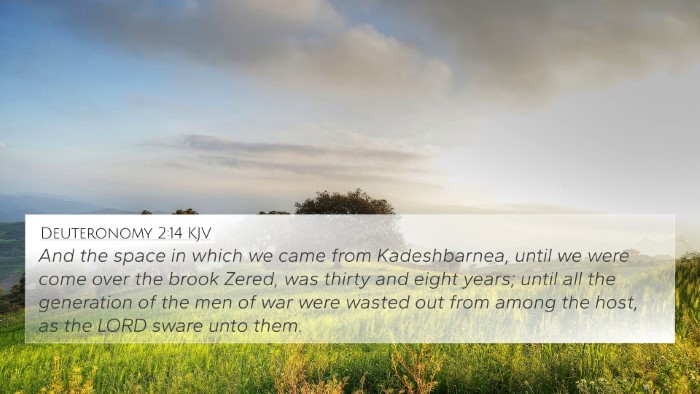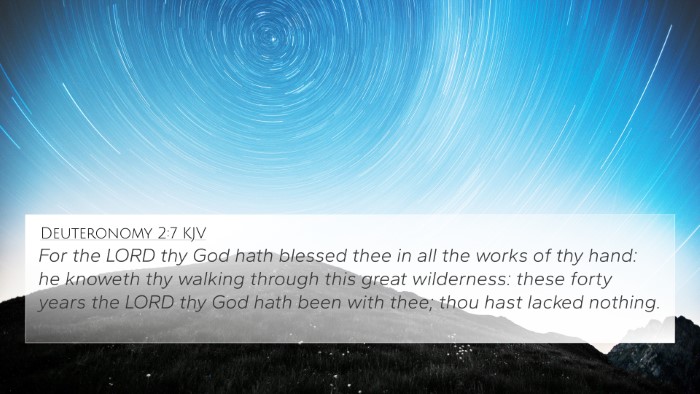Understanding Deuteronomy 2:3
Deuteronomy 2:3 states, "You have circled this mountain long enough. Now turn north." This verse encapsulates a portion of Israel's journey through the wilderness, where divine instruction prompts them to redirect their path.
This scripture serves as an important reminder of God's guidance in times of stagnation. It emphasizes the need for movement and action, under God’s direction. The Israelites had wandered the same route, and the Lord was instructing them to move forward into new territory.
Commentary Insights
Matthew Henry Commentary:
Henry explains that this verse symbolizes the divine command for progress. He draws attention to the concept that God’s directions are not merely for the sake of movement but are also purposeful. The Israelites were called to leave a state of inaction and to seek the promised land.
Albert Barnes Commentary:
Barnes notes the significance of the phrase "turn north." This direction can symbolize a new beginning or a fresh start. The northward move indicates a change in the people’s circumstances and their approach to the challenges ahead. Barnes stresses that God’s guidance is essential for navigating life's paths.
Adam Clarke Commentary:
Clarke highlights the historical context of this command. He connects it to a larger narrative of Israel's journey and the cyclical patterns that can occur in our spiritual lives. Clarke encourages readers to recognize the importance of moving forward when God prompts it, as indecision can often lead to spiritual stagnation.
Cross-References Related to Deuteronomy 2:3
- Exodus 13:17-18: The Lord led the Israelites in the direction they should go.
- Numbers 14:43: The consequences of disobedience upon their journey.
- Isaiah 43:19: God creating a way in the wilderness.
- Philippians 3:13-14: Pressing on towards the goal for the prize of God’s heavenly calling.
- Isaiah 30:21: Your ears will hear a word behind you, saying, "This is the way, walk in it."
- Psalm 37:23: The steps of a good man are ordered by the Lord.
- Proverbs 3:5-6: Trust in the Lord with all your heart and He will direct your paths.
Thematic Connections and Interpretations
The verse not only addresses physical movement but can be seen as an allegory for spiritual growth. In the same way God urged the Israelites to move forward, believers today are called to discern when it is time to progress spiritually, leaving behind old habits or stagnant phases in their life for new endeavors.
Key Themes Identified:
- Divine Guidance: The necessity of seeking God's will for direction.
- Progress and Movement: The importance of not staying in one place spiritually or physically.
- Transformation: Emphasis on leaving behind a past that is no longer fruitful.
Practical Application
Individuals or congregations can reflect on this verse as they assess their current spiritual or communal journeys. Are there areas where they feel stagnant? Are there challenges being faced that require divine guidance to move forward?
Therefore, Deuteronomy 2:3 can be a call to reevaluate one's life direction and embrace the changes that God presents, understanding that following divine instruction can lead to fulfilling one's purpose and experiencing spiritual fulfillment.
Utilizing Cross-References for Deeper Understanding
To further grasp the implications of Deuteronomy 2:3, readers and scholars are encouraged to explore the Bible cross-reference systems. These tools allow for a comprehensive analysis of biblical texts, providing a richer understanding of themes and interconnections in scripture.
By identifying connections between Bible verses, believers can find strength and encouragement in shared messages throughout Scripture, reinforcing the idea of growth and direction.
Conclusion
Emphasizing the key aspects of movement, divine guidance, and new beginnings, Deuteronomy 2:3 stands as a beacon for believers seeking to align their lives with God's purpose. Through careful cross-referencing, the multitude of themes tied to this verse can illuminate the broader narrative of God’s transformative work in the lives of His people.





